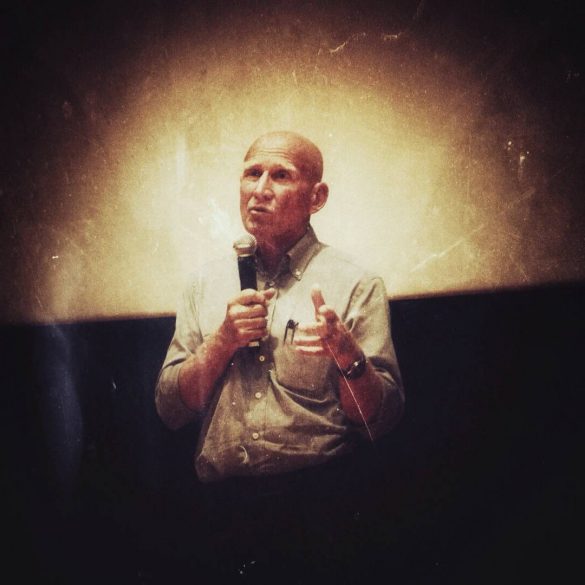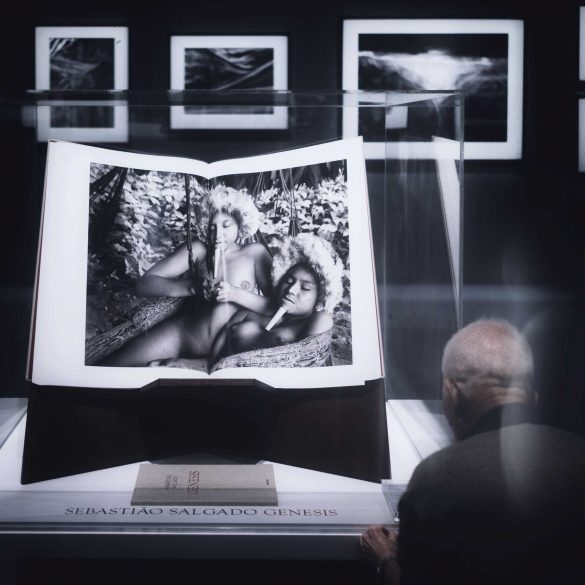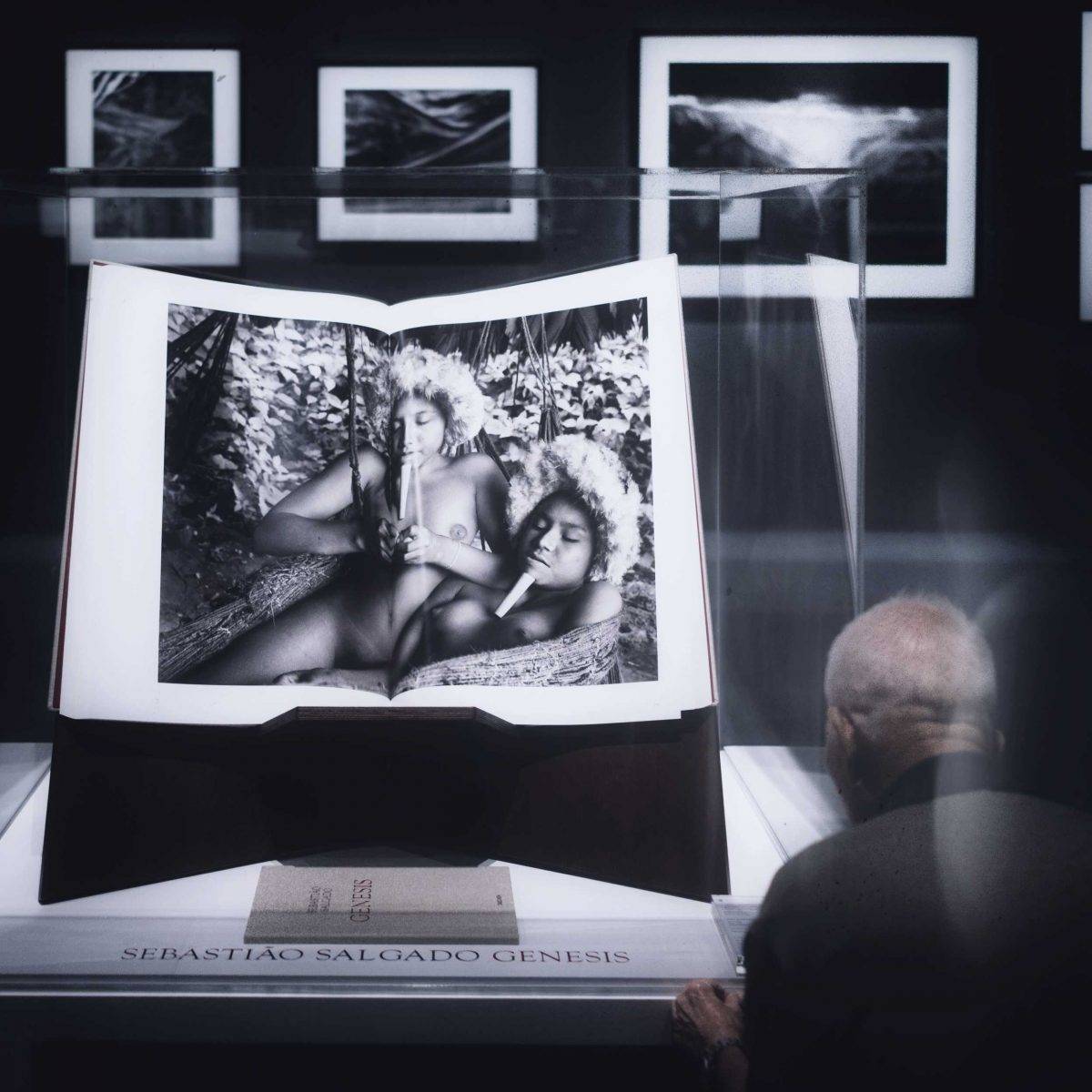
Sebastião Salgado talks ‘Genesis’ at the National Museum of Singapore on 18th May 2014. Photograph © Invisible Photographer Asia (IPA)
Sebastião Salgado : The Power and Privilege of Photography
As part of the Asia premiere of his ‘Genesis’ Exhibition, Sebastião Salgado held a public talk at the National Museum of Singapore on 18th May 2014. Here is an audio recording of the talk and some transcribed highlights.
The Truth Of Photography
Now before I came here, I had a small lunch hosted by Angelita, Director of the Museum, and a group of photographers from the Singapore community. We were together and we discuss a little bit. And you see, from the discussion that came out and that I believe is the truth. That, the photographer, in my case, 70 years old and I see what pictures I did. These pictures are not a group of pictures that I take the decision to do then. They were important to photograph that project. These pictures are my life. They have presented my way of life. They have presented my ideology. They have presented my ethics and my political beliefs. That is the reality. When I am younger like here in this room, there are many young photographers, we had this vocation like what we do, how I could put myself in a project to change the planet with my pictures. In the end, we are part of a much bigger movement. It is the movement of our society, all our society.
The Most Important Point
And I come from Brazil. I come from a small town. And I will tell you a little bit of my story so that you can understand a little bit more of my photography. In reality when you get to my age, I am sure each of you who are here, you are a trajectory, you are in the pipeline in what you will be doing. You will do what you will do. What your life allow you to do and what your beliefs will bring you to do. I believe that is the most important point that if you were to meet and say to when you were a younger photographer. It will make my life much more easy. I can understand the gist now.
On Distance
I must tell you I was born in the interior of Brazil. When I was born, we had very few roads. I was born in a cattle farm. My father had a few cattle farms but we live in one of these farms. For me, I was born in a sort of paradise. Half of the farm was open and had grass and probably 50-60% of the farm was the rainforest. In this big space, you live in incredible freedom. We had about thirty farms that lived in this farm and quite a number of kids played together and I was in total freedom. My mother did not care whether I was in this farm. I was in total security except for the poisonous snakes and the jaguar in the jungle but all this was part of the farm, part of the life. I remember the time to bring the cattle to the slaughterhouse was 1,000 to 1,200 cattle. We had horses, travelling 45 days to the slaughterhouse. And my father can walk this distance in 45 days with a thousand pigs. Pigs cannot be taken by horses so they to walk. And we took more than twenty days to come back. You see, that for me, taught me about time, about distance. When we go today, we take 12 hours back to Paris but if you walk, we will probably take two and a half to three years. In today, live like we live, in cities, we sit all day long, we are in a car, we are in a train, we are in a plane but these two legs that we use all life. That we use before to walk, to climb trees, now we use not too many. But these legs are the feet of photography, we must have time to do the pictures. We must pay a lot of attention to see what happens, the way things happen. I had this big chance when I was a child, to go to this place on a horse. A maximum of 18km per day otherwise the cattle will lose weight. 18km from six in the morning to six in the evening, you have time to see everything. In today’s world, it’s high speed. When I come to teach in Japan, one fly back from Japan to Paris. The plane takes off around 1 am and arrive 6 pm in the evening. We fly all day long. We fly over Siberia, Siberia so beautiful. But during the day, the people flying, take medicine to sleep and close the windows. No one looks for the moon. The twelve-fifteen hour flight from Japan is sleeping. No one looks.

Salgado’s ‘Genesis’ Exhibition at the National Museum of Singapore. Photograph © Invisible Photographer Asia (IPA)
Time & The Power of Photography
In reality in that 45 days on a horse, we are seeing things around us, around the world. And I believe that is the beginning for me. It is very important in my life to learn how to look, how to see. When you look at this show here (the Genesis exhibition), when you see the skies, lots of clouds, all this density. But these were my skies when I was a child. This light, I don’t make it, I don’t create it. This light was inside of me. And each person that is a photographer will be photographing from his past, his mother, his father, his friends from his school and what he learnt from a child. and that in the moment, this fraction of a second. You see, this show here has about 245 pictures. I take an average of 1/250 of a second to shoot one. Some 1/500, some 1/1000 but on average 1/250. If you were to multiply 1/250 by 245 pictures, altogether you have one second. It takes eight years to take these pictures. The time to get there, the time to design this book, the time for my wife to curate the shows, the essence in this show was just one second. This is the power of photography. It is all my life that is there, the way to see, the composition. I tell you, it is so great a privilege to be a photographer. To have this capacity to offer all I have in myself, to tell this story. No one in the history of the creative was possible to do what photographers. And I believe this is the big importance of being a photographer.
Audio Recording of the Talk
The End Of Photography
Photography is changing. It is changing very fast. I was speaking today during lunch time that a few years ago, everyone had a camera. We went on our holidays, we come back, the film, we bring to the corner of the street, we give to the developer. We get the image, we put in an album and we show it to our friends. Five years later, we show it to the family. Thirty years later, the memories of the family, the pictures are there, a little bit yellow, a little bit used. But the pictures are there, the photography are there. Today we have a telephone, the digital but we don’t print more. The photography that was part of the memory is inside the memory of the telephone. We change telephone, half of these we lose. We put in a computer but the images don’t exist anymore. This has changed. We have images but we do not have more of this photography. In the way that things are going, probably in a few years, we have no more photography. The camera that I have inside my bag is capable to do film, as good as the huge camera thirty years ago, the 35mm. I film in 35mm with this, the quality is amazing but it’s half photograph camera, it’s half film camera. In that how you deal with the pictures, in the computer, in the workshop, probably in twenty years, fifty years from now, photography will be no more photography. It will be another thing. In this about a hundred years that photography existed, probably twenty years more will be the end.
The Gift of Photography
The mountain of photography was very strong that allow the guys to docu, go inside Asia, come from Singapore, go South Asia. Me from Brazil, in a flash of a second, go get something and bring to those who have not the opportunity to go there, a representative, a cross-section of reality. It is amazing, fantastic. For me, it was a great privilege to be a photographer.
Audio Transcription by Sebastian Song.
Share


Comments 2
Beautiful. I will take my children to the outdoors as much as I can.
Pingback: 5 Interesting Reads | Photo Life